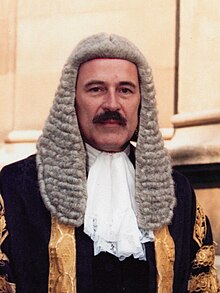
Back روبرت غوف، بارون غوف من تشيفلي Arabic روبيرت جوف ARZ Robert Goff, Baron Goff of Chieveley German
The Lord Goff of Chieveley | |
|---|---|
 | |
| Senior Lord of Appeal in Ordinary | |
| In office 1 October 1996 – 30 September 1998 | |
| Preceded by | The Lord Keith of Kinkel |
| Succeeded by | The Lord Browne-Wilkinson |
| Lord of Appeal in Ordinary | |
| In office 6 February 1986 – 30 September 1998 | |
| Preceded by | The Lord Roskill |
| Succeeded by | The Lord Hobhouse of Woodborough |
| Personal details | |
| Born | Robert Lionel Archibald Goff 12 November 1926 Kinloch, Perthshire, Scotland |
| Died | 14 August 2016 (aged 89) Cambridge, England |
| Nationality | British |
| Spouse |
Sarah Cousins (m. 1953) |
| Children | 4 |
| Residence | Chieveley House |
| Alma mater | New College, Oxford (BA) |
| Awards | Order of Merit of the Federal Republic of Germany (First Class) |
| Military service | |
| Allegiance | United Kingdom |
| Branch/service | British Army |
| Years of service | 1944−1948 |
| Rank | Second Lieutenant |
| Unit | Scots Guards |
| Battles/wars | World War II |
Robert Lionel Archibald Goff, Baron Goff of Chieveley, PC, FBA (12 November 1926 – 14 August 2016) was an English barrister and judge who was Senior Lord of Appeal in Ordinary, the equivalent of today's President of the Supreme Court. Best known for establishing unjust enrichment as a branch of English law, he has been described by Andrew Burrows as "the greatest judge of modern times".[1] Goff was the original co-author of Goff & Jones, the leading English law textbook on restitution and unjust enrichment, first published in 1966. He practised as a commercial barrister from 1951 to 1975, following which he began his career as a judge. He was appointed to the Judicial Committee of the House of Lords in 1986.
Goff was born in his mother's family home in Perthshire, Scotland, and was raised in Hampshire, England. He obtained a place at New College, Oxford, but was called up in December 1944 and served in the Scots Guards in Italy until going to Oxford in October 1948. He earned a first-class degree in Jurisprudence there, and three weeks after receiving his examination results was offered a fellowship at Oxford. He accepted this on condition that he could be called to the Bar first. He was called to the Bar at the Inner Temple in 1951, and appointed fellow and tutor at Lincoln College, Oxford, and a university lecturer in Jurisprudence in 1952. He was High Steward of the University of Oxford from 1991 to 2001.
As one of the few early academics-turned-judges, Goff long advocated a complementary view of the role of the legal academic and judge. In this respect, the former Lord Justice of Appeal Sir Stephen Tomlinson said that "no judge has done more than Robert to ensure that the views of legal academic commentators now regularly inform the decision-making in our higher courts".[2]
Towards the later part of his life, he developed an interest in sharing perspectives with foreign lawyers and judges. For building bridges between judges in the United Kingdom and Germany, Goff was awarded the Order of Merit of the Federal Republic of Germany (First Class).
© MMXXIII Rich X Search. We shall prevail. All rights reserved. Rich X Search